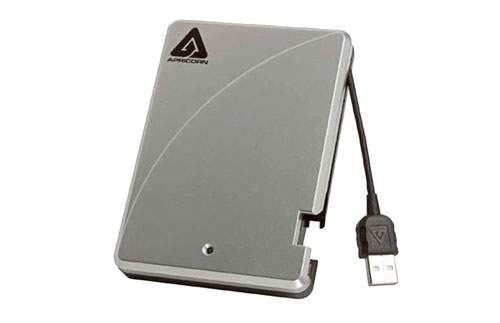Apricorn’s Aegis Portable 3.0 is a handsome 2.5-inch, silver and black, USB 3.0 external drive with an integrated cable—and it ships in both hard-drive and SSD flavors.
If that isn’t a siren’s call to see just how much of a performance boost you get from a solid-state drive in an external USB 3.0 enclosure, I don’t know what is. Apricorn thoughtfully shipped us both versions so we could answer that call.
There’s no outward difference between the SSD version (outfitted with a 256GB SanDisk SD6SB1M256G1022I) and the hard-drive model (which comes with a 1TB, 2.5-inch Toshiba MQ01ABD100), aside from the fact that the SSD version weighs an ounce or two less.
The Lab ran both models through PCWorld’s 10GB-file stress tests, copying data to and from a 16GB RAM drive, and the differences were as vivid as Apricorn’s advertising claims—at least when writing data to the drives. The 256GB SSD version wrote our single 10GB file at 334 megabytes per second, which is almost three times faster than the hard-drive version’s 115.5 MBps.
With a 10GB mix of small files and folders, the difference in write speed was even more pronounced: 102.7 MBps to 22.6 MBps. But 22.6 MBps is poky, even for a hard drive. We saw similarly subpar write performance from Apricorn’s Aeigis Bio, so it might be the bridge controller. By way of comparison, Seagate’s Wireless Plus 1TB wrote the same test file at 93 MBps, and other external USB 3.0 hard drives we’ve tested typically measure anywhere from 50 MBps to 80 MBps.
On the read tests, on the other hand, the drives finished in a near dead heat. Both the SSD version and the hard-drive version of the Aegis Portable 3.0 read the single 10GB file at 263 MBps. In the 10GB files-and-folder test, the hard-drive version actually edged out the SSD version 214 MBps to 212 MBps.
Price and other factors
The superior write performance of the SSD versions of the Apricorn Aegis Portable 3.0 carries a hefty premium: The 256GB model costs $399 and the 512GB unit sells for $599, compared to just $79 for the 500GB, $109 for the 1TB, and $189 for 1.5TB versions. Clearly there’s some pre-purchase contemplation to be done.
That said, the SSD version weighs significantly less than the hard-drive versions, making it a boon for those who like to travel light. And with no moving parts, the SSD version is not subject to damage from drops, bumps, and other physical impacts; you can be as ham-handed as they come and still not have to worry about hurting the drive.
The SSD-based Aegis Portable 3.0 is a nice product for those who regularly back up or copy files onto an external drive, and need to do so in a hurry. In other usage scenarios, you might be better off buying an external hard drive and saving your cash for other purchases.
Note: I’d be remiss if I didn’t mention that you can grab an unpopulated 2.5-inch USB 3.0 enclosure and populate it with a bare 256GB SSD for considerably less than $400. It might not come with an integrated cable or a carrying case, and you’d have separate warranties for the enclosure and the SSD, but you would save a lot of cash.
Source: www.pcworld.com
